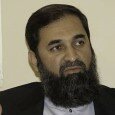By A Rahim Khan –
Pique‘s Exclusive
In conversation with Gideon Levy – the most hated journalist rather man in Israel
“If not us, then who? If not now, then when?” There is certain vigor, even a brio to this paraphrased apothegm attributed to the revered 1st century Jewish scholar, Hillel the Elder. It calls for action and immediacy, borne from a stance that preached humanity and peace. But it also appears as if fashioned in the face of adversity; calling upon individuals to act if so tasked.
If this latter interpretation is to be believed, it seems then that this aphorism was perfectly coined for the noted Israeli journalist and author, Gideon Levy, who for the past three decades has been a man most contentious.
Writing for the Israeli daily, Haaretz, Mr. Gideon Levy has made it a point to weekly visit the Occupied Territories such as Gaza and report, unwaveringly, about the lives of the Palestinians. His articles are peopled with those affected by the ongoing Israeli occupation, underscoring the very fact, to his countrymen, that such an unfortunate reality exists within their own “backyards.”
Having been a staunch detractor of the Israeli government and having persistently denounced the occupation, Mr. Levy has earned himself the reputation of an almost-Judas in his homeland, experiencing with it the perils that such a personality would face. He has been shot at, publicly accosted and threatened, constantly earned the ire of the government, repeatedly been decried as a traitor and ‘self-hating Jew’ and most often or not been branded as ‘the most hated man in Israel’.
But despite all of this, Mr. Levy has soldiered on, ensuring that the other side of the story, free from propaganda, “brainwashing”, untruths or political correctness, is reported. His is a lone voice for while many dissenting Jewish voices maybe heard; dissenting Israeli voices barely register as a whisper.
The recent 50-day conflict in Gaza saw a veritable blitz that left the city in tatters, its people bloodied and the peace process extinguished. Lone was Mr. Levy’s voice in condemnation, but it had never been clearer.
In an exclusive interview with Pique, Mr. Levy spoke at length about his convictions, the state of Israel and whether or not there would ever be peace between Israel and Palestine.
A fellow Israeli writer, Amos Oz once said that the conflict between Jews and Palestinians is ‘a clash between right and right’; would you agree with this statement?
GL: No, no. Because claiming ‘right and right’ means symmetry and there is no symmetry in this conflict. I don’t want to say that the Israelis don’t have just claims, sure they have. Obviously the Palestinians have just claims. But I totally object to describe it like this, with all due respect and I have a lot of respect for Amos Oz, who is also my personal friend but it’s not a symmetric conflict because it’s very clear that one side, one party is the occupier and the other is the occupied one, I say no more, this makes the whole difference.
The Israeli-Palestinian conflict tends to have a very cyclical nature in that talks begin often concluding in failure, followed by periods of violence and stalemate only to resume again. Why do you think this is? Are both sides forever to be stuck in this rut?
I think because there was never a genuine Israeli intention to put an end to it. And maybe not to put an end to the occupation. Israel never, at any stage, had a serious intention to put an end to the occupation.
You used the word ‘genuine’ and that was going to be my next question, do you feel there is a ‘genuine’ desire on behalf of the Israelis towards the peace process, towards peace between it and Palestine?
Not a ‘just’ one. By all means not a just one. I think there is something in the people in this. I don’t think the Israelis, basically, are perceiving the Palestinians as equal human beings like them, with equal rights like them. This maybe the core, that’s the core of everything. Because they don’t perceive them as having the same rights as this piece of land and this leads to everything.
The recent conflict saw widespread condemnation from the international community, yet Israel continued unphased by this, why has Israel always adopted this uncompromising position choosing to possibly ignore rather than engage? Does not care, does not want to make friends?
Sure they want to have friends but they live in denial. They trust only their military force and they think that Israel will be able to live forever on its own and as long as the United States is backing Israel and the United States is backing Israel like no other country in the world. As long as this continues, they don’t need much more. Now they have also this false perception that the world, the whole world is anti-Semitic, the whole world is against Israel. Whatever Israel does, that’s a very effective way to release yourself from your own responsibility and blame the other. It’s the world’s fault, it’s not Israel’s fault. And as long as Israelis don’t pay for it and they don’t pay for it, they couldn’t care less. If this will be translated into concrete, practical steps, then I think Israel will change its policy but until now it has been working very well (for them).
You have been quoted as saying, “That we Israelis are the ultimate and only victims”, do you think this notion feeds Israeli policy? Will they ever break out of it?
It must break out but it is a long process because this is deeply rooted in Israeli way of thinking, this feeling…first of all the victimization. Whatever happens, Israel is the victim and also history, which largely intensified it and amplifies it and exaggerate it. But it is something very deep rooted. This is a process to see the other as a victim, that’s a long way to go.
As an extension of this question, you have described Israeli society as being ‘racist’ pointing this out in recent articles such as the treatment of African asylum seekers – do you not think that the historical victimization of the Israelis would have made them more open to the plight of others?
It should have been so but it went in the opposite direction. The lesson, the lesson that the Jews carried from the Holocaust is not the lesson which you suggest which should have been the lesson but is an opposite lesson, namely, that after the Holocaust, we Jews have the right to do whatever we want and that we Jews can trust only ourselves, can only trust our military force – that’s the only thing we can trust and that’s a very dangerous path.
Now there tends to be a difference in what a government may believe and what a people may believe but whenever it comes to Israel we often see both government and the populace on the same page, Why has there not been more dissenting voices like your own, like others because we don’t tend to hear many of these voices?
You don’t hear them because they hardly exist. And they hardly exist because there’s a whole brainwash machinery in this country led by the media, which is a free commercial media, not run by the government and not even pressed by the government, totally free. And this brainwash system has been going on for decades, namely showing this total twisted picture as if Israel is forced to have occupation, Israel is forced to react brutally, that Israel is forced to kill hundreds of civilians, that there is no other way and this somehow has been very effective and it’s much easier to live with those perceptions , that this is the reality rather than with my perceptions, you know it’s a big contrast between the place I live in and the state I am a part of and what I think about it.
You’ve been described as both the most hated man in Israel as well as the most heroic – how would you describe yourself?
For sure not the most heroic one but in this war (referring to the recent 50-day conflict), I think the first part (‘the most hated’) became very valid because in this war there were also surveys and polls to show that I became, at least for the time of the war, now it’s much more relaxed but at the time of the war I was by far the most hated Israelis by the Israelis.
So keeping this in mind, seeing as how you’ve had threats to your life, you’ve been ostracized, why do you continue?
I continue because first of all I don’t know any other alternative. I will not shut my mouth. I will not leave this place because I belong to this place and I’m struggling for the justice of this place and I will not change my opinions – none of these alternatives is a real alternative, is an option for me so I’ll continue for as long as I can.
You mentioned the free press in Israel, does it not strike you as odd that a journalist and writer like yourself, who has been so opposed, has been able to continue to this day?
This is thanks to many things, but the main thing is the platform, namely my newspaper which in my view is the only real newspaper in Israel, the only professional newspaper in Israel and the only newspaper that provides full, total freedom to writers like me. I couldn’t have written for any other paper in Israel, no way.
Israel is very adamant in describing itself as the only ‘true’ democracy in Israel, would you agree with this?
Look by definition, an occupying country cannot be perceived as a democracy, it’s ridiculous. Because if in your backyard there are 3-4 million people who live without any civil rights, under a very brutal tyranny, then you can’t be considered as a democracy. Having said this, Israel is a liberal democracy for its citizens, mainly for its Jewish citizens and in these terms, I’m the best example, my freedom is part of this partial democracy. And it shouldn’t be taken for granted. My freedom is a good proof to this schizophrenic freedom in which it is a democracy for certain people in a certain piece of land but is not a democracy for other people in the occupied territories.
In the September 11 attacks, some 2,500-3,000 lives were lost, prompting the US War on Terror. In the recent conflict with Israel, around more than 2,000 Palestinian lives were lost, in light of this do you think it justified or even acceptable for Palestinians or then Hamas to engage in violence?
Look, the Palestinians will do their best, unfortunately they are extremely weak and now maybe even weaker than ever, very, very little international support, a few allies with a world that is becoming more and more Islamophobic… with Europe which has become very Islamophobic and so is the United States and Israel can benefit out of it and is benefitting out of it. For example, they compare Hamas to ISIS; it’s one of those propaganda tactics and of course this leaves the Palestinians in a corner.
Recently the US brought both sides together for talks but nothing came of these, how sincere do you think the present US administration is to these talks and peace in the Middle East?
Why should we go in their minds? Maybe they are very sincere, maybe their heart is in the right place, I’m sure Obama’s heart was in the right place but the outcome was shameful, the outcome was total, real passiveness in the last 6 years. The key is in their hands, they could have done so much more to push Israel, they’ve never dared to do so and you know we judge the outcome, and the outcome is very shameful.
Now one last question and this may seem optimistic, but do you think we’ll ever see peace between Israel and Palestine in our lifetimes?
Listen, I don’t think so and I don’t see any scenarios which lead to it but at the same time I must tell you that say both of us were talking in the late 80s and I would’ve told you that within months the apartheid system in South Africa would fall, Soviet Russia is going to fall and the Berlin Wall is going to fall..within months, you would’ve thought that I was out of my mind. And all this happened. So you know, if to go according to logic, it doesn’t make sense, I don’t see peace getting in my life and maybe even your life, on the other hand we’ve seen so many disputes in history, take Germany and Israel, take Germany and France, would you believe 50 years ago that they would be allies? I mean, I don’t see a scenario but I can’t exclude it































































































